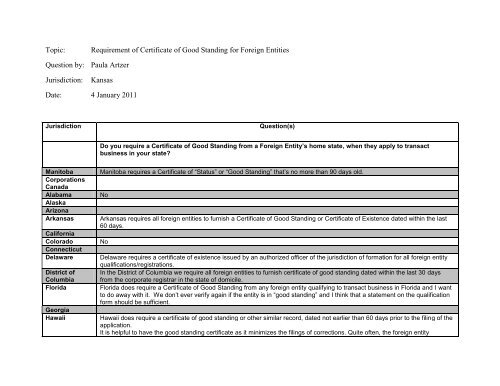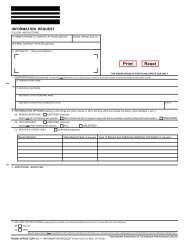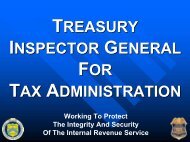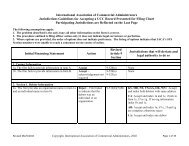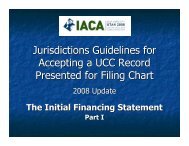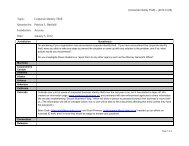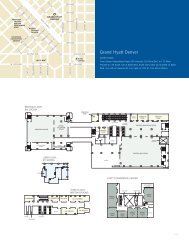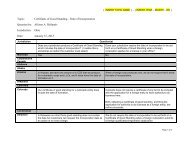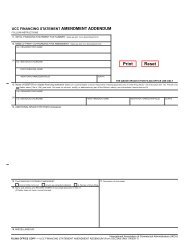Certificates of Good Standing for Foreign Entity Filings - IACA
Certificates of Good Standing for Foreign Entity Filings - IACA
Certificates of Good Standing for Foreign Entity Filings - IACA
Create successful ePaper yourself
Turn your PDF publications into a flip-book with our unique Google optimized e-Paper software.
Topic:<br />
Requirement <strong>of</strong> Certificate <strong>of</strong> <strong>Good</strong> <strong>Standing</strong> <strong>for</strong> <strong>Foreign</strong> Entities<br />
Question by: Paula Artzer<br />
Jurisdiction:<br />
Kansas<br />
Date: 4 January 2011<br />
Jurisdiction<br />
Question(s)<br />
Do you require a Certificate <strong>of</strong> <strong>Good</strong> <strong>Standing</strong> from a <strong>Foreign</strong> <strong>Entity</strong>’s home state, when they apply to transact<br />
business in your state?<br />
Manitoba<br />
Corporations<br />
Canada<br />
Alabama<br />
Alaska<br />
Arizona<br />
Arkansas<br />
Cali<strong>for</strong>nia<br />
Colorado<br />
Connecticut<br />
Delaware<br />
District <strong>of</strong><br />
Columbia<br />
Florida<br />
Georgia<br />
Hawaii<br />
Manitoba requires a Certificate <strong>of</strong> “Status” or “<strong>Good</strong> <strong>Standing</strong>” that’s no more than 90 days old.<br />
No<br />
Arkansas requires all <strong>for</strong>eign entities to furnish a Certificate <strong>of</strong> <strong>Good</strong> <strong>Standing</strong> or Certificate <strong>of</strong> Existence dated within the last<br />
60 days.<br />
No<br />
Delaware requires a certificate <strong>of</strong> existence issued by an authorized <strong>of</strong>ficer <strong>of</strong> the jurisdiction <strong>of</strong> <strong>for</strong>mation <strong>for</strong> all <strong>for</strong>eign entity<br />
qualifications/registrations.<br />
In the District <strong>of</strong> Columbia we require all <strong>for</strong>eign entities to furnish certificate <strong>of</strong> good standing dated within the last 30 days<br />
from the corporate registrar in the state <strong>of</strong> domicile.<br />
Florida does require a Certificate <strong>of</strong> <strong>Good</strong> <strong>Standing</strong> from any <strong>for</strong>eign entity qualifying to transact business in Florida and I want<br />
to do away with it. We don’t ever verify again if the entity is in “good standing” and I think that a statement on the qualification<br />
<strong>for</strong>m should be sufficient.<br />
Hawaii does require a certificate <strong>of</strong> good standing or other similar record, dated not earlier than 60 days prior to the filing <strong>of</strong> the<br />
application.<br />
It is helpful to have the good standing certificate as it minimizes the filings <strong>of</strong> corrections. Quite <strong>of</strong>ten, the <strong>for</strong>eign entity
Idaho<br />
Illinois<br />
Indiana<br />
Iowa<br />
Kansas<br />
Kentucky<br />
Louisiana<br />
Maine<br />
Maryland<br />
Massachusetts<br />
Michigan<br />
Minnesota<br />
Mississippi<br />
incorrectly states their company name.<br />
If the good standing certificate is not submitted, we search <strong>for</strong> the company name from the home state's website.<br />
We use this site, http://www.business.gov/register/incorporation/<br />
This site lists 54 States.<br />
Illinois requires certificates <strong>of</strong> good standing, existence or its’ equivalent <strong>for</strong> LLC’s, LP’s and LLP’s. Corps. however, require a<br />
current certified copy <strong>of</strong> their articles <strong>of</strong> incorporation and any subsequent amendments from their jurisdiction <strong>of</strong> origin.<br />
Louisiana requires all <strong>for</strong>eign entities to furnish a Certificate <strong>of</strong> <strong>Good</strong> <strong>Standing</strong> or Certificate <strong>of</strong> Existence dated within the last<br />
60 days.<br />
Michigan requires a Certificate <strong>of</strong> <strong>Good</strong> <strong>Standing</strong> from home jurisdictions <strong>for</strong> a <strong>for</strong>eign entity to qualify to transaction business<br />
in the state.<br />
In Minnesota, we have eliminated the need <strong>for</strong> a non-Minnesota entity to provide a certificate <strong>of</strong> any kind from the home<br />
jurisdiction. The entity simply asserts on the application that they have complied with the organizational laws <strong>of</strong> the home<br />
jurisdiction.<br />
Here is an example <strong>of</strong> how we put this in statute:<br />
303.06 APPLICATION FOR CERTIFICATE OF AUTHORITY.<br />
Subdivision 1.Contents.<br />
In order to procure a certificate <strong>of</strong> authority to transact business in this stat e, a <strong>for</strong>eign corporation shall make<br />
application there<strong>for</strong> to the secretary <strong>of</strong> state, which application shall set <strong>for</strong>th:<br />
(1) the name <strong>of</strong> the corporation and the state or country under the laws <strong>of</strong> which it is organized;<br />
(2) if the name <strong>of</strong> the corporation does not comply with section 303..05, then the name which it agrees to use in<br />
this state;<br />
(3) the address <strong>of</strong> its proposed registered <strong>of</strong>fice in this state and the name <strong>of</strong> its propos ed registered agent in<br />
this state;<br />
(4) that it irrevocably consents to the service <strong>of</strong> process upon it as set <strong>for</strong>th in section 5.25, or any amendment<br />
thereto;<br />
(5) a statement that the <strong>of</strong>ficers executing the application have been duly authorized so to do by the board <strong>of</strong><br />
directors <strong>of</strong> the corporation; and<br />
(6) that the corporation has complied with the organizational laws in the jurisdiction in which it is<br />
organized.
Missouri Missouri requires all <strong>for</strong>eign entities to furnish a Certificate <strong>of</strong> <strong>Good</strong> <strong>Standing</strong> or Certificate <strong>of</strong> Existence dated within the last 60<br />
days.<br />
Montana Montana requires all <strong>for</strong>eign entities to furnish a Certificate <strong>of</strong> <strong>Good</strong> <strong>Standing</strong> or Certificate <strong>of</strong> Existence dated within the last 6<br />
months.<br />
Nebraska<br />
Nevada<br />
New Hampshire<br />
New Jersey<br />
New Mexico<br />
New York<br />
North Carolina<br />
North Dakota<br />
Ohio<br />
Oklahoma<br />
Oregon<br />
Nevada currently requires a certificate on <strong>for</strong>eign corporations qualifying in Nevada. But we are looking to change that to a<br />
declaration by the subscriber that they are in good standing in their state <strong>of</strong> <strong>for</strong>mation, along with the jurisdiction and original<br />
file date.<br />
New Hampshire does require a Certificate <strong>of</strong> <strong>Good</strong> <strong>Standing</strong> from any <strong>for</strong>eign entity qualifying to transact business in New<br />
Hampshire but would like to do away with it. We don’t ever verify again if the entity is in “good standing” and I think that a<br />
statement on the qualification <strong>for</strong>m should be sufficient.<br />
NYS requires good standing certificates <strong>for</strong> an application <strong>for</strong> authority <strong>for</strong> <strong>for</strong>eign entities. The certificate must indicate that the<br />
entity is an “existing” entity. If the good standing certificate is in a <strong>for</strong>eign language it has to be translated under oath <strong>of</strong> the<br />
translator. I’m not sure what all this accomplishes. It would be good to know if jurisdictions are moving away from this<br />
requirement and if there is any downside to doing so.<br />
North Dakota requires all <strong>for</strong>eign entities to furnish a Certificate <strong>of</strong> <strong>Good</strong> <strong>Standing</strong> or Certificate <strong>of</strong> Existence dated within the<br />
last 60 days.<br />
Ohio requires a certificate <strong>of</strong> good standing from the jurisdiction <strong>of</strong> <strong>for</strong>mation <strong>for</strong> a <strong>for</strong>eign entity. At this time, Ohio law requires<br />
the certificate to say the following:<br />
(1) The exact corporate title;<br />
(2) The date <strong>of</strong> incorporation;<br />
(3) The fact that the corporation is in good standing or is a subsisting corporation.<br />
Oklahoma requires all <strong>for</strong>eign entities to furnish a Certificate <strong>of</strong> <strong>Good</strong> <strong>Standing</strong> or Certificate <strong>of</strong> Existence dated within the last<br />
60 days.<br />
Oregon currently requires a certificate <strong>of</strong> existence issued within the last 60 days. I believe this is a Revised Model Business<br />
Corporation Act requirement, but it extends to the rest <strong>of</strong> our entities as well.<br />
We are trying to change our statute to allow <strong>for</strong> database confirmation <strong>of</strong> existence, rather than using a certificate. We see<br />
value in confirmation that an entity is traceable back to a home state. If we look back to our ECRF brethren, they've found that<br />
it's even more valuable to maintain continuity between the domicile and <strong>for</strong>eign registrations. With today's interconnectivity, it<br />
seems to me a trivial matter to connect, and a weapon if you're concerned about corporate ID theft.<br />
I know more states are going to the "on their heads be it if they lie" model, and I respect that approach. But I think there is<br />
value in reliable in<strong>for</strong>mation, and we are seeing increasing pressure to provide verifiable ownership info. I think we need to<br />
balance the needs <strong>of</strong> law en<strong>for</strong>cement and consumers against increased friction on businesses. One way is to make a data<br />
trail that can be followed if necessary - like ID that relies on breeder ID documents. The more connections that can be made to
Pennsylvania<br />
Rhode Island<br />
South Carolina<br />
South Dakota<br />
Tennessee<br />
Texas<br />
Utah<br />
Vermont<br />
Virginia<br />
Washington<br />
West Virginia<br />
Wisconsin<br />
Wyoming<br />
an entity, the greater the certainty that you "know" that entity.<br />
Rhode Island requires a good standing with all business qualifications. However, we still require certified articles and/or<br />
amendments from qualifying non-pr<strong>of</strong>it corporations.<br />
In Texas, we have eliminated the need <strong>for</strong> a non-Texas entity to provide a certificate <strong>of</strong> any kind from the home jurisdiction.<br />
The entity simply asserts on the application that they have complied with the organizational laws <strong>of</strong> the home jurisdiction.<br />
Utah does require a Certificate <strong>of</strong> <strong>Good</strong> <strong>Standing</strong> from any <strong>for</strong>eign entity qualifying to transact business in Utah but would like<br />
to do away with it. We don’t ever verify again if the entity is in “good standing” and I think that a statement on the qualification<br />
<strong>for</strong>m should be sufficient.<br />
Virginia does not require a certificate, but we probably should. We have found instances where we registered a <strong>for</strong>eign entity<br />
that was dissolved/canceled in its home jurisdiction.<br />
Washington does require a certificate <strong>of</strong> good standing <strong>for</strong> any <strong>for</strong>eign entity (except an LLP) when they apply to transact<br />
business.<br />
Additional comments:<br />
Full text <strong>of</strong> email:<br />
Kansas would appreciate knowing if you require a Certificate <strong>of</strong> <strong>Good</strong> <strong>Standing</strong> from a <strong>Foreign</strong> Entities home state, when they apply<br />
to transact business in your state.<br />
Thank you, <strong>for</strong> those <strong>of</strong> you who have already responded.<br />
Sincerely,<br />
Paula
PAULA ARTZER<br />
Business Analyst<br />
Kansas Secretary <strong>of</strong> State<br />
785-296-2908 P | 785-296-4570 F<br />
Memorial Hall, 1st Floor | 120 SW 10th Ave. | Topeka, KS 66612-1594<br />
www.kssos.org<br />
Are you registered to vote? www.voteks.org


